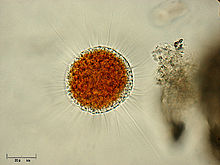Vampyrellidae
| Vampyrellidae | |
|---|---|
 |
|
| Vampyrella lateritia | |
| Scientific classification | |
| Domain: | Eukaryota |
| (unranked): | SAR |
| (unranked): | Rhizaria |
| Phylum: | Cercozoa |
| Order: | Aconchulinida |
| Family: |
Vampyrellidae Zopf, 1885 |
The family Vampyrellidae Zopf, 1885 is a subgroup of the order Vampyrellida West, 1901 within the phylum Cercozoa. Based on molecular sequence data, the family currently comprises the genus Vampyrella, and maybe several other vampyrellid amoebae (e.g. Gobiella). The cells are naked and characterised by radiating, filose Pseudopodia (also referred to as filopodia) and an orange colouration of the main cell body.
In former times the family Vampyrellidae contained several genera (e.g. Vampyrella, Gobiella, Leptophrys, Platyreta, Theratromyxa) and was identical with the order Vampyrellida West, 1901, also known under the name "Aconchulinida". However, based on molecular sequence data it seemed resonable to restrict the family Vampyrellidae to a subgroup (containing the genus Vampyrella) and to establish another family for the genera Leptophrys, Platyreta and Theratromyxa, namely the Leptophryidae Hess et al., 2012.
When free-floating, the cell is spherical and around 30 μm across, with long radially directed filose pseudopods as well as distinctive shorter club-shaped ones, so that it resembles a heliozoan. Moving, the cell stretches out and takes a more typical amoeboid form, with an obvious distinction between the clear periphery and pseudopods and the greenish interior. In this form it finds its way into algae cells and feeds on their interiors. A few other vampyrellids are parasitic on fungi. As such, these vampyrellids can be an important control of parasitic rust fungus of wheat and other crops.
Vampyrellids characteristically have with tubular cristae. Together with the nucleariids they include the majority of the naked filose amoebae.
...
Wikipedia
